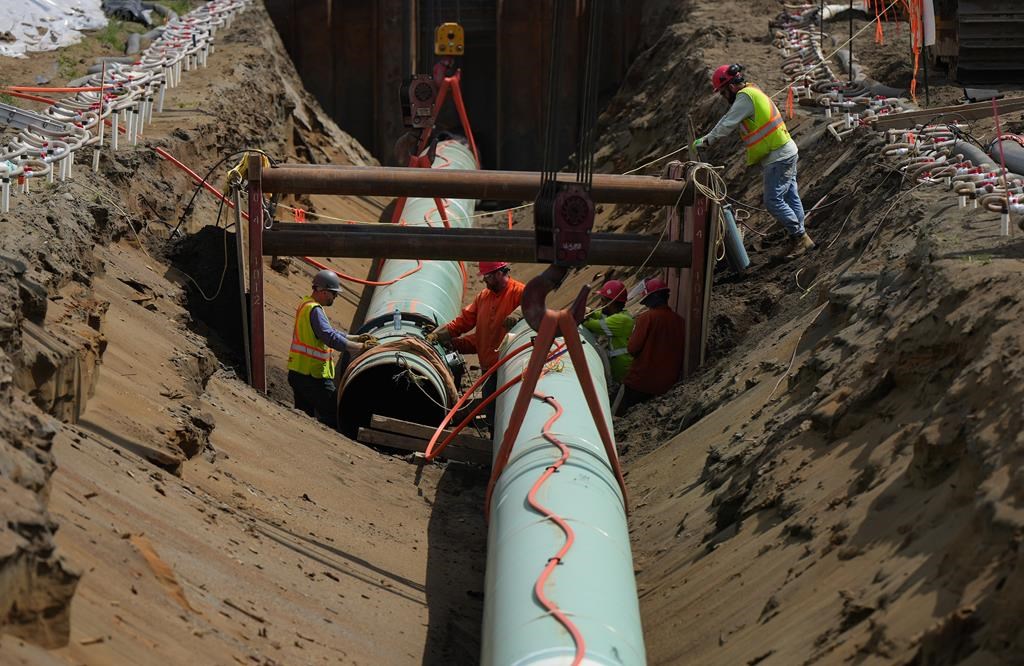A possible east-west pipeline and nuclear energy were key elements over which federal party leaders clashed – and in some cases agreed – during Wednesday’s French-language debate. Not usually on the same page, Liberal Leader Mark Carney and Conservative Leader Pierre Poilievre aligned on support for new oil and gas pipelines as well as nuclear energy as a matter of national security. Carney said Canada should produce more petrol to reduce imports from the U.
S., which he said was threatening Canada. “We need a low-risk, low-cost, low-carbon petrol to be competitive in the long term.

We need to invest in carbon stockage, carbon capture as well,” he said. Poilievre argued pipelines were a matter of sovereignty and that an east-west energy corridor would reduce Canadians’ and Quebecers’ dependence on the U.S.
“Quebecers that buy Alberta oil, it needs to go through the U.S., giving the power to Donald Trump on our own energy,” said Poilievre, addressing Bloc Québécois Leader Yves-François Blanchet.
“You say you’re in favour of sovereignty. I’m in favour of economic sovereignty and energy sovereignty, and that requires a pipeline across Canada.” Carney agreed with Poilievre’s concerns about Canadian energy passing through the U.
S. “Our relationship with the U.S.
has completely changed,” the Liberal leader said. “The pipelines are a national security problem for us.” Blanchet opposed the pipelines, saying Quebecers did not benefit from a national corridor.
“We have to progressively get out of oil because paying for damages from climate change will cost thousands of dollars per family per year,” he said. New Democratic Party Leader Jagmeet Singh said he favoured public investments in clean and renewable energy as opposed to increasing oil production and nuclear energy. “I want to spend public funding in a clean electricity grid across the country.
Renewable energy is the need of the future,” Singh said. Singh added the climate crisis was not a future concern, and that Quebecers have already experienced its effects like extreme temperatures, wildfires and floods. “I spoke to a mom who said, ‘I am scared for my children when they go out to play in British Columbia, because they cannot breathe with all the forest fires,’” he said.
“It’s clear that we have to act. We have to protect our environment.” Blanchet criticized the Liberals for spending billions of dollars on subsidies for oil and gas companies last year, as well as the high costs of the Trans Mountain pipeline that cost Quebec taxpayers and took nine years to complete.
The Bloc leader said “Quebec was the best-placed to become a clean energy superpower; we have a huge market directly to the south without even asking Canada.” Poilievre said a Conservative government led by him would never subsidize pipelines. “It’s not necessary.
They’re extremely profitable,” he said. “The only reason it costs a lot right now is because we have laws and rules that prevent construction with bureaucracy.” Poilievre also criticized the other parties for supporting Bill C-69 – the Impact Assessment Act and the Canadian Energy Regulator Act.
The Supreme Court of Canada ruled in a 5-2 decision that parts of the law were unconstitutional in October 2023. “C-69 bans oil and gas pipelines across Canada,” he said, “I will repeal the law to allow construction of hydroelectric projects, mines and pipelines to deal with Donald Trump and become self-sufficient.” When moderator Patrice Roy asked if a government headed by Poilievre would impose pipelines if provinces or Indigenous nations opposed them, Poilievre cited the example of the Northern Gateway pipeline project in Western Canada, which he said had the support of 80 per cent of the First Nations.
“In those cases, I think, we have to go with the majority.” He said the companies operating the pipeline should pay a part of their taxes directly to the First Nations to combat poverty in their communities. Carney said he would never impose a pipeline project if provinces or First Nations opposed it.
But he said that during his latest meeting with provincial premiers, they agreed on developing a national energy corridor and removing trade barriers to build projects faster. “With that and by working with the chiefs of First Nations, we can have a solution,” Carney said. Carney and Poilievre also agreed on accelerating nuclear energy across Canada.
The Liberal leader said nuclear was a great opportunity for the country. “We have uranium,” he said. “We have big nuclear energy companies like Candu and Westinghouse and Cameco, and the technology.
So absolutely, yes.” Poilievre blamed bureaucracy for slowing down construction of nuclear power plants without adding to its safety. “I will fire ‘politicians’ in the Canadian Nuclear Safety Commission and permit scientists to do their job so we can add nuclear power source,” the Conservative leader said.
Both Blanchet and Singh said they were not in favor of expanding nuclear energy..
Top

Federal leaders clash on nuclear energy, pipelines during French debate

A possible east-west pipeline and nuclear energy were key elements over which federal party leaders clashed – and in some cases agreed – during Wednesday’s French-language debate. Not usually on the same page, Liberal Leader Mark Carney and Conservative Leader Pierre Poilievre aligned on support for new oil and gas pipelines as well as nuclear [...]











-1745121369054_v.webp)